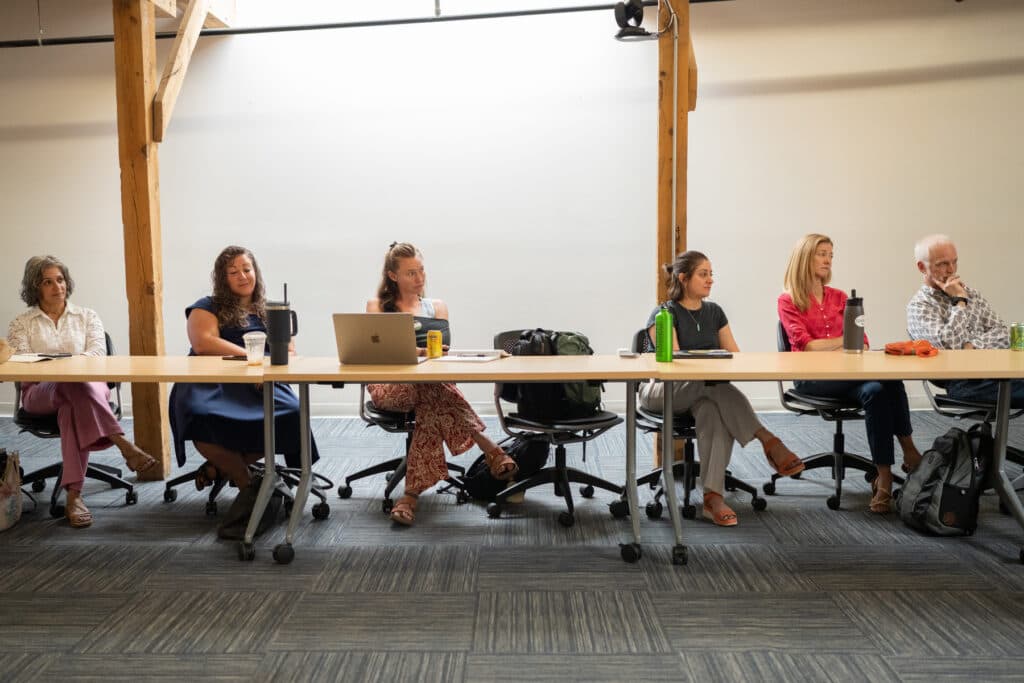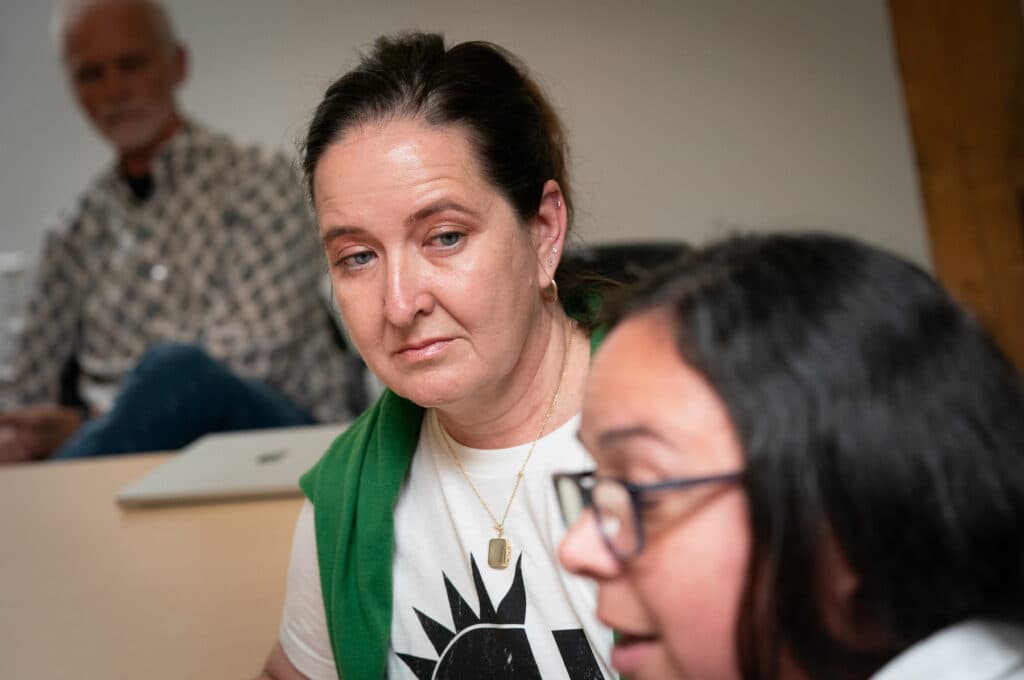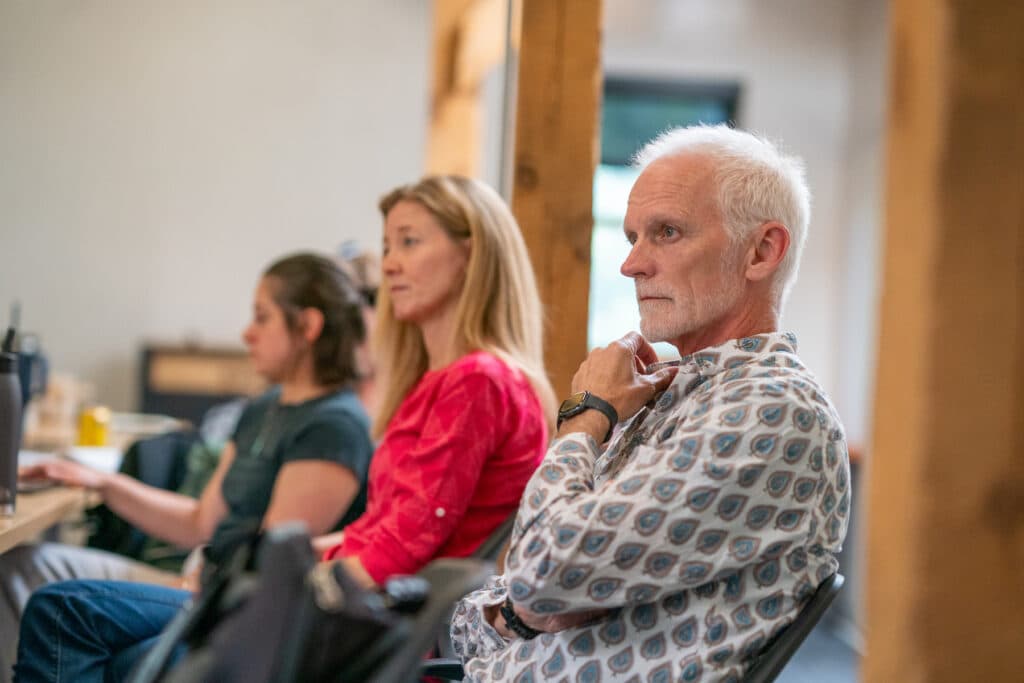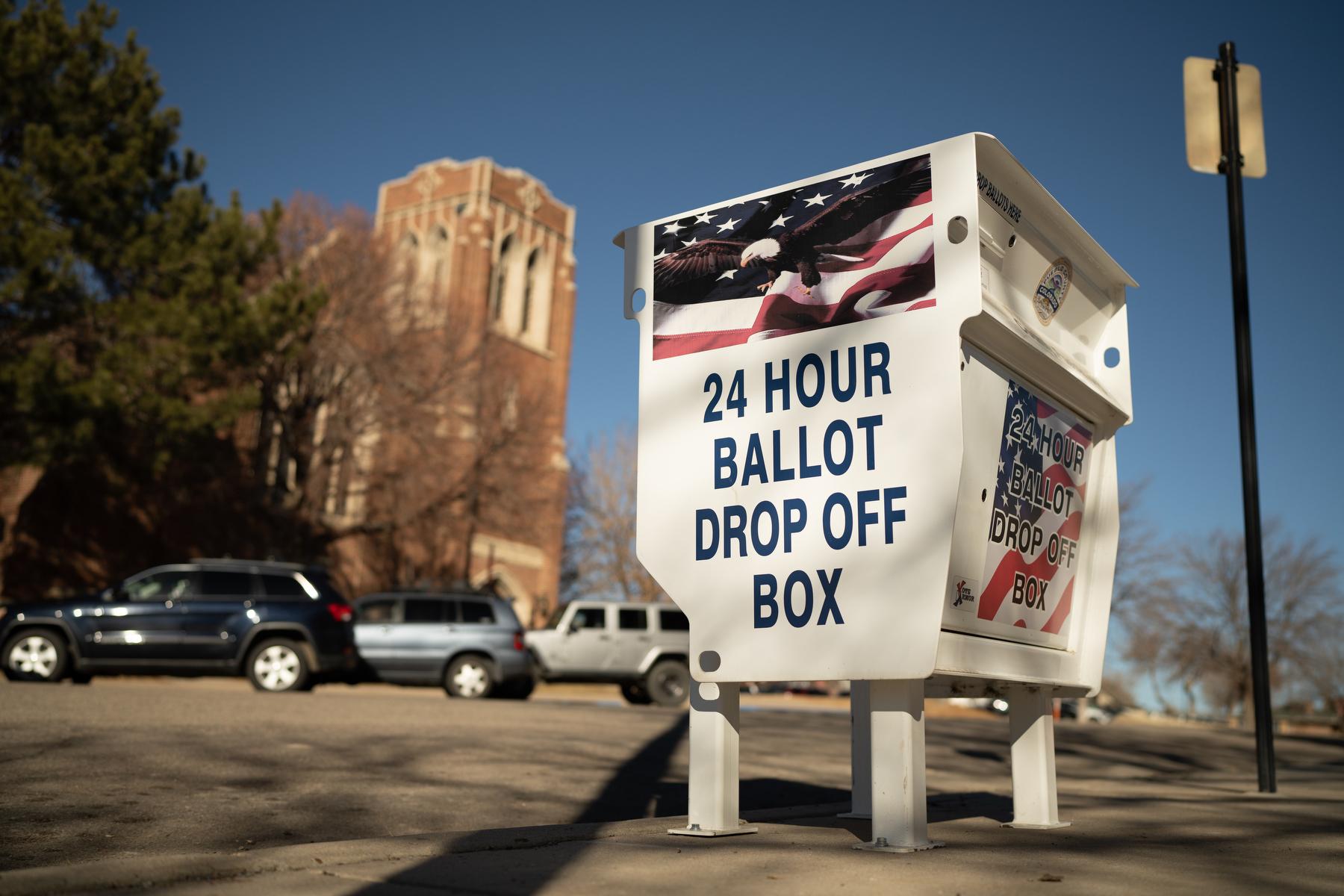
Updated at 2:59 p.m. on Wednesday, Sept. 3, 2024.
On a recent Tuesday evening, a group of laid-off federal workers gathered at the Posner Center for International Development, a nonprofit and coworking space in a historic brick building in North Denver. The agenda included advice on how to refresh resumes, improve a LinkedIn profile, network, interview for jobs, and contend with AI applicant screening.
Keith Ives, of Wheat Ridge, carted his toddler with him. He’s CEO of Causal Design, which was counting on $42 million in contracts and grants from the federal government—and years of work. “It's functionally a death blow for our business,” he said. His company contracted with the now-defunct United States Agency for International Development (USAID) to provide third-party oversight.
“So when USAID or its partners deliver emergency food aid in Sudan, we go in and observe those distributions to help prevent waste, fraud, and abuse,” he explained. Not anymore.
Colorado is home to tens of thousands of federal workers. Many of them were laid off or furloughed by the Trump administration earlier this year. Two aid workers started a support group to help some of the thousand or so people now unemployed — with the psychological, financial, and career-related fallout.
“We're going to meet every Tuesday until every single person finds a new job, a new reality, a new pivot, a new something,” said co-founder Susan Abbott.
The Tuesday Group started informally. Abbott was in East Africa — working with rural radio stations—in January, when the federal stop-work order came down. “It was clear things were not going to be the same,” she said.
Her job at USAID, an independent government entity that provided foreign aid, ended abruptly, and she came home to Colorado.

The Trump administration had issued the stop-work order. The agency was essentially shuttered by February.
Co-founder of the Tuesday Group, Alexandra Fiorillo, continues to work as a global aid consultant. “It was incredibly scary and lonely in that first month,” she said.
Nearly 80 people came to their first meetup in February, which they called a “sad hour” rather than a happy hour. Now the group and its listserv and Signal group chat have grown to over 300 people.
While USAID was gutted, other federal agency workers were offered buyouts via the newly created Department of Government Efficiency (DOGE).
DOGE offered a buyout, or deferred resignation option, to many workers in February. About 75,000 federal workers accepted the offer. Their payments end on September 30th. The U.S. government has paid these professionals not to work—often hiring contractors to backfill, in the name of government efficiency.
CPR News created an anonymous survey for affected Coloradans in July. Respondents described sudden layoffs and terminations, which caught many off guard. They held positions at U.S. Fish and Wildlife, the U.S. Department of Agriculture, the Department of Energy, the Department of Transportation, USAID, and many others. It’s how we learned about the Tuesday Group.
Most of the group’s members are USAID workers or contractors. Organizers imagine that the scope will grow — certainly as federal paychecks stop on Oct. 1 for federal workers who opted for the DOGE buyout.
“It's not just about the employment, it's about the whole life that has been really ripped away from all of our community members,” said Fiorillo.
The Tuesday groupies said it is a space where they can feed their souls and their bellies a little, too. Potato chips, pretzels, and popcorn sit on a table in an airy conference room with exposed brick, as workers gathered for tips on job-hunting.
“We're going through this existential crisis of what's happening to America, what's happened to our jobs,” said Abbott. “...but also realizing—we have children, we have homes, we have to take care of our loved ones.”
Cruel and unusual
Layoffs happen. “But layoffs don't normally happen like they're happening now,” said Abbott.
Fiorillo echoed the sentiment, “This is cruel. This is cruel.”
Since Inauguration Day, 1,077 federal workers have filed for unemployment benefits in Colorado, according to the state labor department.
Abbott added, “We have people who have engineering degrees, PhDs, law degrees, you name it. And their lives have more or less been destroyed in a matter of … months.”

Organizers sent members a survey to get a better picture of their immediate needs. They found that 60 percent had tapped into savings and 20 percent had taken on new debt. More than half had applied for unemployment, but many were still waiting for it to be approved. A third had delayed healthcare since losing their jobs.
So the group formed a subcommittee focused on lobbying. It was a new idea for many of them, who came from federal jobs where they weren’t allowed to lobby. “So we've also gone back to school in terms of civics … most of us were not allowed to do lobbying or advocacy due to the nature of our work,” Abbot said.
But they reached out to state lawmakers with a list of requests: rent abatement, rent forgiveness, childcare assistance, and healthcare.
They reached out to Gov. Jared Polis multiple times. The response: “crickets,” said Fiorillo.

“We'll be here until everyone finds something that allows them to stay in their homes, keep health insurance, have affordable childcare, stay healthy, stay sane, stay supported,” she reiterated.
Indeed, one of the biggest needs has been navigating unemployment claims. It’s not a simple process and can take lots of paperwork and many weeks before being approved. “It’s like 20 different systems and you have to learn all of them at once. And it's very overwhelming,” said Abbott.
That challenge was represented in their survey findings, too. She said that while legislators didn’t take any formal action to provide assistance, some of U.S. Sen. Michael Bennet’s and U.S. Rep. Diana DeGette’s staff had personally spent hours helping laid-off workers with their unemployment claims.
Pivoting to the private sector
Many of the Tuesday Group’s members are now looking for work in the private sector. Some are turning to consulting. Some have turned to any work they can get, like catering and bartending.
With so many people laid off and looking for a livable wage at once, “The competition is fierce,” Fiorillo said.
Some of their members are leaving the state. One member moved in with friends. “No one is coming to save us,” said Fiorillo.

Many of the members are highly specialized. They speak foreign languages, they are experts in media, food security, health issues, infectious diseases and other, more niche topics.
“No one would turn down a private sector job,” said Fiorillo. But applicants are finding they must contend with AI screening tools that make the application process essentially a rubric. The Tuesday Group brought in speakers and assistance from Head Global, a career development company focused on international sectors.
They provided training on optimizing job applications for AI screening tools, guidance on using ChatGPT to write cover letters, and advice on how to translate public sector skills into private sector lingo.
Some of the Tuesday Group attendees are competing against one another for the same jobs.
“Technology is changing, and we have to not only deal with unemployment insurance, health insurance, but we have to modernize and become smarter with all these new tools in emerging tech,” said Abbott. “And it's hard.”
Editor’s note: This story has been corrected to remove a quote with an incorrect fact on the size of Colorado’s federal workforce.








